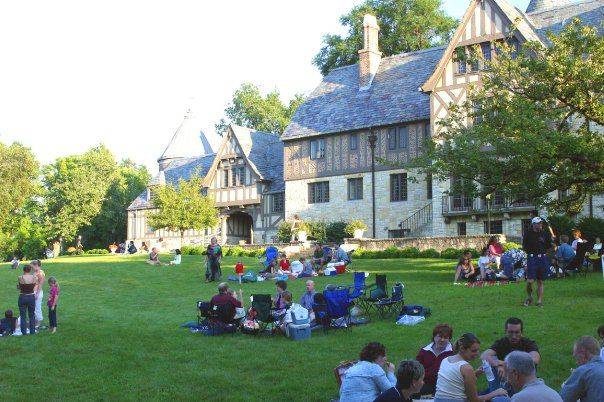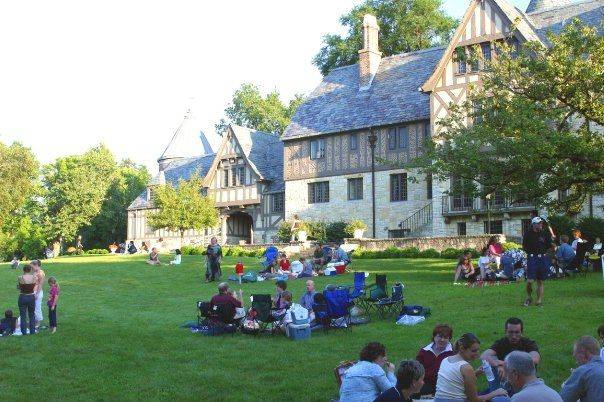
The Illinois Shakespeare Festival, while not technically a local arts event, is nonetheless a highly regarded venue and a destination for many of Champaign-Urbana’s theatre lovers every summer. This year, ISF will offer three somewhat intertwined pieces in repertory — Much Ado About Nothing, Elizabeth Rex, and Antony and Cleopatra. For the ever-popular Much Ado, an all-male cast will be utilized, making the romantic comedy a little more authentic (Shakespeare-wise) than a lot of productions. In an intriguing twist, this staging of the comedy is virtually a play within another play—the other being Elizabeth Rex, the play that opens the following night. As the ISF press release puts it:
“The play takes place on the night before Elizabeth’s lover, Essex, is executed for treason by her order. Requiring distraction, Queen Elizabeth I determines to see a new play by William Shakespeare called Much Ado About Nothing (seen this season as Elizabeth would have seen it) and summons Shakespeare and his actors to spend the night in her company — a night of discovery that reveals both her vulnerability and strength.”
The Festival will conclude with Antony and Cleopatra, directed by ISF Artistic Director Kevin Rich.
I spoke with Rich as he prepared for the summer’s opening, and he had plenty to say about the Festival, the Bard, and what it’s like to play in the rain.
———
Smile Politely: First, I’ll need a little background on you. How long have you been Artistic Director, and what is your personal history with the stage?
Kevin Rich: Here’s my bio:
Kevin became ISF’s Artistic Director in 2013, but began working at ISF in 2009 as an actor, and has appeared in such roles as Puck in A Midsummer Night’s Dream, Richard in Richard III, and both Dromios in Comedy of Errors. Additional experience includes Milwaukee Shakespeare, Chicago Shakespeare, Kentucky Shakespeare, Shakespeare and Company, Portland Center Stage, San Jose Rep, Yale Rep, and the American Theatre Company. He wrote and directed ISF’s 2013 Theatre for Young Audiences production, The Magical Mind of Billy Shakespeare, now published by Playscripts, Inc, and his series of Shakespeare abridgements are a centerpiece of the educational and community engagement of the ISF Touring Company. Kevin is also a member of the acting faculty at Illinois State University; previous teaching experience includes Kenyon College, Carthage College and the University of Wisconsin at Parkside. In 2008, he formed his own workshop company, and he continues to facilitate workshops in colleges, high schools, and theatre festivals around the country. He is member of AEA and SAG-AFTRA, a Certified Associate Teacher of Fitzmaurice Voicework®, the 2010 ISF John Stephens Equity Actor, and a recipient of the Oliver Thorndike Acting Award at the Yale School of Drama.
SP: OK, well, now I’m exhausted. Seriously, though… Much Ado and Antony and Cleopatra are classics with rich histories, of course, but I’m very interested in how the non-Shakespearean productions are chosen. Is there a specific set of criteria that makes them appropriate for the Festival?
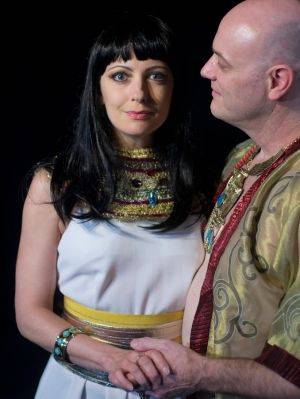 Rich: Each summer we produce two Shakespearean plays and one new play in the spirit of Shakespeare. When people ask me, “Why is a Shakespeare festival producing new plays?,” my response is, “Shakespeare wrote new plays.” Considering that Shakespeare adapted the classics of his time for a contemporary audience, it seems to me to be in his spirit to nurture playwrights of our time who are doing the same thing. So I look for plays that have a direct connection to Shakespeare or his plays or — like last year’s beautiful Failure: A Love Story by Jeff-award-winning playwright Philip Dawkins — simply have characteristics of Shakespeare’s plays: poetic language, heightened theatricality, and universal, timeless themes. I believe strongly in Shakespeare as a populist, not an elitist; and, to that end, I look for plays that are fundamentally human and accessible to everyone. Having said that, this season’s Elizabeth Rex by Timothy Findley has some adult language in it and is edgier than last summer’s offering; but, given its connection to Shakespeare and inclusion of both Much Ado About Nothing and Antony and Cleopatra (the two Shakespeare plays we’re doing as well), I couldn’t resist.
Rich: Each summer we produce two Shakespearean plays and one new play in the spirit of Shakespeare. When people ask me, “Why is a Shakespeare festival producing new plays?,” my response is, “Shakespeare wrote new plays.” Considering that Shakespeare adapted the classics of his time for a contemporary audience, it seems to me to be in his spirit to nurture playwrights of our time who are doing the same thing. So I look for plays that have a direct connection to Shakespeare or his plays or — like last year’s beautiful Failure: A Love Story by Jeff-award-winning playwright Philip Dawkins — simply have characteristics of Shakespeare’s plays: poetic language, heightened theatricality, and universal, timeless themes. I believe strongly in Shakespeare as a populist, not an elitist; and, to that end, I look for plays that are fundamentally human and accessible to everyone. Having said that, this season’s Elizabeth Rex by Timothy Findley has some adult language in it and is edgier than last summer’s offering; but, given its connection to Shakespeare and inclusion of both Much Ado About Nothing and Antony and Cleopatra (the two Shakespeare plays we’re doing as well), I couldn’t resist.
SP: Next, given the Festival’s open-air presentation, I have to ask: What considerations go into planning (and staging) outdoor theatre versus a “traditional” indoor show? I’m also curious just how adverse weather has to become before a production is affected… or postponed… or stopped. What countermands “The show must go on?”
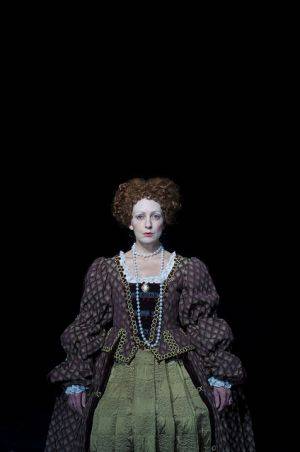 Rich: We play in light rain, and sometimes even less-than-light rain. Our audience are real troopers: if showers are forecasted, they often bring raingear and love toughing it out. At the first sign of lightning, however, we cancel immediately. Further, if the play we are performing features a lot of dancing or sword fighting (as they often do), we have to be very careful when the stage floor is wet. We have a term, “rain pace” – when rain is falling, we try to move through the show as quickly as possible while remaining safe. Performing out in the elements is an amazing experience. I once saw an outdoor production of King Lear in which rain actually began to fall during the famous storm scene. Truly magical. I’ll never forget it. Another huge benefit of performing outside: the audience is in plain view. One of the principal reasons Shakespeare’s plays were so popular when he originally produced them was that the actors actually interacted with the “groundlings,” who were pressed against (and sitting on) the stage. Without audience interaction, it’s my opinion that Shakespearean productions can feel a bit like museum pieces; but when actors engage audience directly, as Shakespeare intended, they feel as fresh and alive (and funny!) as I imagine they did when Shakespeare wrote them. Since we can see our audience in our outdoor theater, we speak to them directly. We even offer onstage seating (we call them the Bardhead seats) for only $20; there are only 10 available for each performance, and they were really popular last summer. Actors engaging audience directly is essentially theatrical: one thing film and television can never do.
Rich: We play in light rain, and sometimes even less-than-light rain. Our audience are real troopers: if showers are forecasted, they often bring raingear and love toughing it out. At the first sign of lightning, however, we cancel immediately. Further, if the play we are performing features a lot of dancing or sword fighting (as they often do), we have to be very careful when the stage floor is wet. We have a term, “rain pace” – when rain is falling, we try to move through the show as quickly as possible while remaining safe. Performing out in the elements is an amazing experience. I once saw an outdoor production of King Lear in which rain actually began to fall during the famous storm scene. Truly magical. I’ll never forget it. Another huge benefit of performing outside: the audience is in plain view. One of the principal reasons Shakespeare’s plays were so popular when he originally produced them was that the actors actually interacted with the “groundlings,” who were pressed against (and sitting on) the stage. Without audience interaction, it’s my opinion that Shakespearean productions can feel a bit like museum pieces; but when actors engage audience directly, as Shakespeare intended, they feel as fresh and alive (and funny!) as I imagine they did when Shakespeare wrote them. Since we can see our audience in our outdoor theater, we speak to them directly. We even offer onstage seating (we call them the Bardhead seats) for only $20; there are only 10 available for each performance, and they were really popular last summer. Actors engaging audience directly is essentially theatrical: one thing film and television can never do.
As much as we love performing outdoors, it is sometimes just too hot or too wet; in the event of severely inclement weather, we have an indoor rain/heat stage (the air-conditioned Center for the Performing Arts on the Illinois State University campus) so the show will always go on. We also offer indoor matinees on the weekends, making it possible to see our whole season in a two-day weekend getaway, with performances rain or shine.
SP: What, in your opinion, sets Illinois Shakespeare Festival apart from other summer destinations/offerings? For the first-time attendee, let’s say… What’s in it for them?
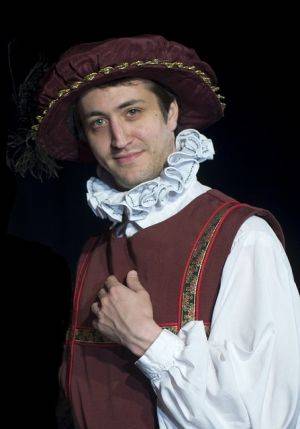 Rich: The Festival is in its 37th year, and we have grown to the point that we are nationally recognized as one of the top Shakespeare festivals in the country. I now audition between 500-750 actors for each season. [Editor’s note: YIKES.] One of the most frequent post-show comments I hear from community members is, “I’m so proud that this Festival is here in our town!” I love hearing that. Our theater is one of the most beautiful places I’ve ever worked in, and the grounds of Ewing Manor are incredible. Families come and picnic on the lawn before the show, and we offer free preshow entertainment (and live Jazz on the weekends) in the courtyard. In addition to our mainstage productions, we have a free Theatre for Young Audiences production on Wednesday and Saturday mornings, and on Saturday evenings at 6pm, we bring in Chicago’s Improvised Shakespeare Company, which is seriously one of the funniest shows I have ever seen. And we have lectures, panel discussions, post-show talkbacks and ice cream socials for the community. Something for everyone. With all that’s going on, it really does feel like a festival.
Rich: The Festival is in its 37th year, and we have grown to the point that we are nationally recognized as one of the top Shakespeare festivals in the country. I now audition between 500-750 actors for each season. [Editor’s note: YIKES.] One of the most frequent post-show comments I hear from community members is, “I’m so proud that this Festival is here in our town!” I love hearing that. Our theater is one of the most beautiful places I’ve ever worked in, and the grounds of Ewing Manor are incredible. Families come and picnic on the lawn before the show, and we offer free preshow entertainment (and live Jazz on the weekends) in the courtyard. In addition to our mainstage productions, we have a free Theatre for Young Audiences production on Wednesday and Saturday mornings, and on Saturday evenings at 6pm, we bring in Chicago’s Improvised Shakespeare Company, which is seriously one of the funniest shows I have ever seen. And we have lectures, panel discussions, post-show talkbacks and ice cream socials for the community. Something for everyone. With all that’s going on, it really does feel like a festival.
SP: Finally, having talked a little about the challenges, let’s end with the benefits… What, to you, is the best part of putting on this Festival, season after season? What do you most look forward to?
Rich: Surprising expectations. My first summer here, we were doing Richard III and I met an audience member at one of our post-performance ice cream socials. He was a guy in a plaid shirt and a John Deere hat who had never seen a play before. He came up to me and asked, “Did you guys rewrite the play?” I said, “No, why?” And he said, “Because I understood it.” That was the best thing ever. Opening people up to something they thought they wouldn’t like is my favorite thing about doing Shakespeare.
———
For those who plan to attend, tickets to any (or all) of ISF’s summer offerings can be obtained here. From what I’ve read, what I’ve been told, and what I’m hoping for, it should be well worth your time and travel.
Photo courtesy of Illinois Shakespeare Festival.








